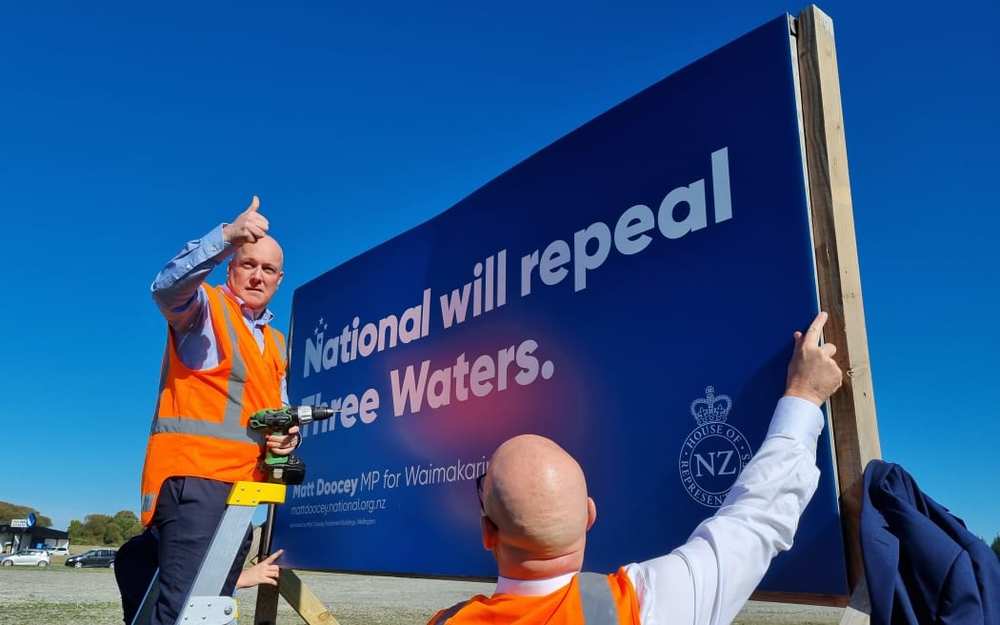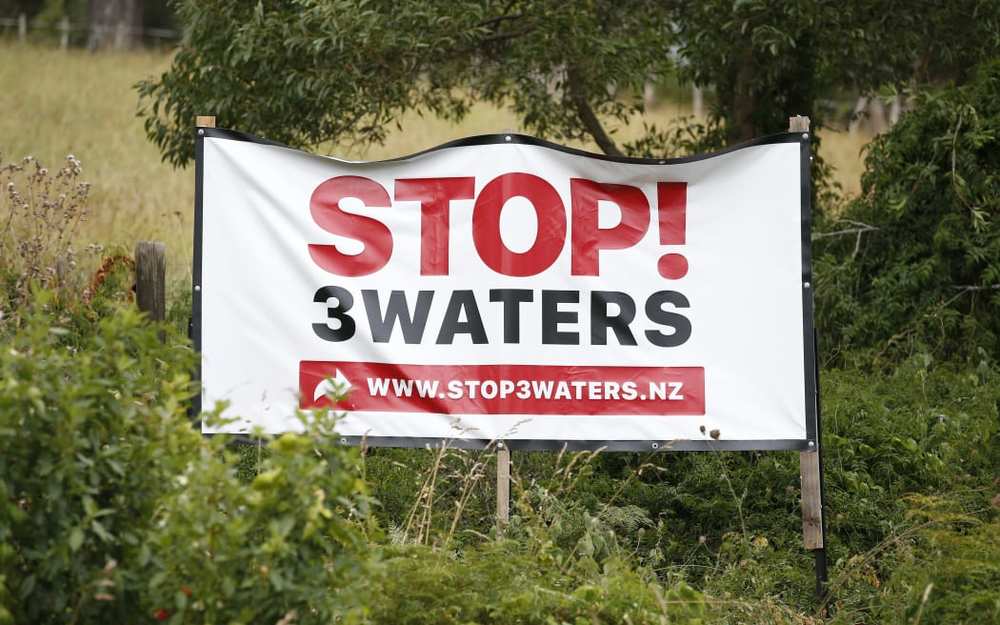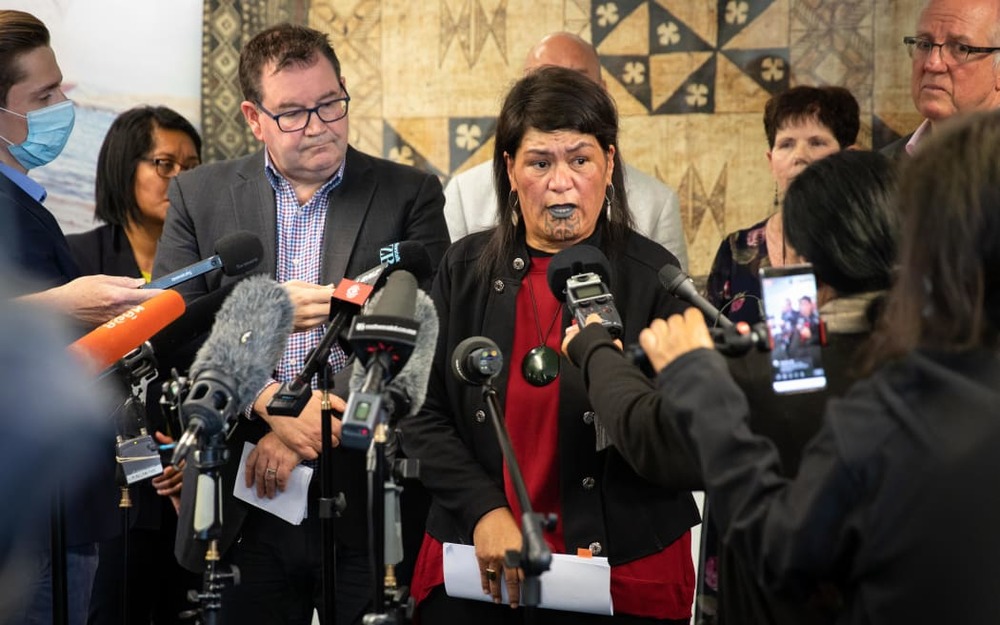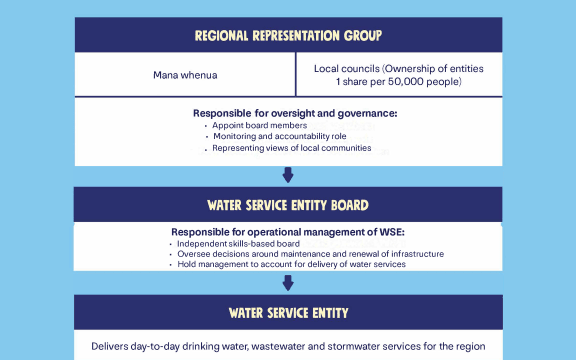Three waters Part II: What you need to know
Reporting by RNZ
27 May 2022, 9:17 PM
 Photo: RNZ
Photo: RNZExplainer - The government is forging ahead with its updated plan to overhaul the way New Zealand manages water despite fierce pushback from councils, ratepayers and opposition parties.
The project has gone through major changes since its inception, so where is it now and what does it look like?
If you're reading this and wondering what on earth the three waters are, check out our initial guide on the government's reform plans: Three waters: What you need to know
Redirecting the flow: A change of plan or two, or three
The original model proposed by the government has gone through a few revisions since it was first outlined.
After councils' largely negative feedback to that model through eight weeks of consultation, Local Government Minister Nanaia Mahuta confirmed in October what councils and political parties had warned of: local authorities would not be able to opt out.
She also revealed a working group would re-examine the reforms and propose changes, aiming to resolve councils' concerns over ownership, governance, representation and accountability.
The group was set to report back in March and given an 'exposure draft' of the legislation for setting up the water service entities (WSEs).
That draft was a tweaked version of the original model, based on the feedback provided by councils. Its introduction to Parliament would also be delayed to allow time for the group to provide feedback.
In the meantime, a transition unit led by Sir Brian Roche was set up in February at the Department of Internal Affairs, to manage shifting the massive amount of water infrastructure management from councils to the four new entities.
When the working group reported back in March it recommended further revisions.
At the end of April, Mahuta - with Finance Minister Grant Robertson in a supporting role - announced the government would accept nearly all the group's 47 recommendations. This included the establishment of a new yet-to-be detailed consumer protection body.

Photo: RNZ / Jean Edwards
Going downstream: Timings
The legislation setting up the entities is yet to be brought to Parliament. It will take the form of two bills, the first to be introduced in the middle of this year and passed before 2023.
The second is expected to be introduced before the end of the year, and passed next year.
Mahuta has said the first bill would take care of the governance, representation and local voice concerns, while the second would cover the "functional elements of the water service entities".
Amid all this, the local government elections are coming up in October, with a general election set for next year.
National and ACT have promised to repeal the three waters legislation and return water assets to councils if elected.
ACT wants to introduce public-private partnerships in "shared services" arrangements where GST would also be shared with councils to manage water.
If those parties don't get their way in election '23, the WSEs are set to take over management of water from 1 July 2024.

An anti-three waters billboard alongside SH1 south of Whangārei. Photo: Northern Advocate / LDR
Water under the bridge? Mandates and mixed messages
The reforms have been broadly unpopular - with many councils, members of the public, and opposition parties alike - for a variety of reasons.
While the changes proposed by the working group have changed some minds, others remain in vocal opposition and this can be expected to heat up ahead of the council elections in October.
It is telling that the working group's very first recommendation urged the government to begin a positive communications campaign.
The previous $3.5m advertising effort was roundly criticised and labelled a 'missed opportunity' by former National minister Anne Tolley, who had set up the initial review of the three waters system.
While ministers would not commit to another campaign, they did acknowledge the need for further public awareness ahead of consultation through the select committee process.
Another part of the problem has been the government's approach to working with councils. While it has engaged directly with some, others complained of being left out - and they've been burned before.
While the government finally confirmed in October the reforms would be mandatory for councils, Cabinet documents made clear it had known for some time that councils opting out was unlikely to be viable, and had decided in June to pursue a mandatory strategy.
Cabinet agreed to delay final and public confirmation of that however, until after a "short period of socialising the policy proposals and final support package with the local government sector" which would include the eight-week consultation.
Mahuta defended this approach in December, saying consultation was in good faith, that a mandated approach had never been ruled out, and the Internal Affairs (DIA) steering group and local government advocacy group LGNZ had been kept informed throughout.
Problem is, not all councils are members of LGNZ, which was also subject to a non-disclosure agreement with the government over the reforms including a clause guaranteeing the group would not actively oppose the mandatory approach.
It left councils opposing the new model to voice their criticisms in isolation, against the powerful central government.
Perhaps predictably, more than 30 banded together to set up the Communities 4 Local Democracy group, which acknowledges the need for reform and supports co-governance but says the proposed solution fails to support local voice and protect community property rights.
They have come up with their own solution: improved council-owned models and regional council-controlled organisations, funded by a levy on water services, with the government able to intervene if new water standards are not met.
It would also require subsidisation to meet investment shortfalls however, and Minister Mahuta argues such a model has been assessed and rejected as it would fail to achieve the savings for ratepayers and taxpayers the government's plan offers.

Local Government Minister Nanaia Mahuta Photo: RNZ / Angus Dreaver
Through the wringer: A new model
With all this going on, the legislation setting out the functions, structure and responsibilities of the WSEs can be expected to look a bit different from what was originally proposed:
Representation Groups more influential, ISP removed
As before, there are still four organisations - known as "water service entities" - set to take over water management from the 67 councils and small suppliers, but the structure is a little different.
Each organisation is a body corporate which will have its own Regional Representation Group (RRG) with 12-14 members - half representing councils and half representing mana whenua - who will offer strategic oversight.

A flow chart showing the updated arrangement of the three waters governance model. Photo: Department of Internal Affairs
This group's decisions must be reached by consensus, and where that's not possible the chairs can call for a 75 percent majority vote. Its work is resourced by the organisation. Members are selected by the councils, iwi and hapū the group represents, and must meet certain competence requirements. They are forbidden from operational decisions and unable to direct the entity at a project, investment or management level.
That more direct work will be done by the executives - the "board" of the organisations - who are selected based on competence in water management, with other requirements including understanding of Te Tiriti o Waitangi.
These execs are regularly independently reviewed. They are appointed by a subgroup of RRG members and can be removed by the same group if they are failing to live up to their responsibilities.
The government's revisions scrapped the "Independent Selection Panel" which would have done the appointing and removing on behalf of the boards, after financial analysis found increasing council influence in this way would not affect the organisations' credit ratings.
New sub-regional representation groups will also help inform the RRG about local concerns. These will also maintain 50-50 council-Māori representation.
Each water service entity is guided by an individual "constitution" setting out its unique points of difference. Among other things, this will include:
- RRG and board membership structures (e.g. how many from which council, whether a specific mix of councils or rural areas need to be represented, how mana whenua representation is apportioned).
- The competence requirements for RRG and board members
- The number and type of sub-regional representation groups
- How often board members are reviewed
The first constitution for each entity will be set down by the minister, but changes can be made by consensus agreement of the RRG.
The Auckland-Northland region's Entity A will have a special representation group setup: four Auckland Council representatives, four Tāmaki Makaurau iwi/hapū representatives, one from each Northland Council, and three iwi/hapū representatives from Te Tai Tokerau.
Conflicts of interest for the boards and RRGs alike must be declared, as well as any payments to members.
Reporting requirements clarified
The RRG publishes a Statement of Strategic and Performance Expectations, covering a three year period, annually.
Mana whenua separately produce a Mana o Te Wai statement on the priorities for Māori. The entity must respond with a plan within two years. Statements can be made on an iwi or hapū basis, or as a combined statement covering multiple groups, and may relate to singular or multiple catchments.
The minister publishes a Government Policy Statement on water, in consultation with WSEs, RRGs and other stakeholders, which the entities must adhere to. This statement may be amended at any time.
The entities must also publish:
- A Statement of Intent, published each year relating to the next three years, which must be signed off by the RRG and resolved by the entity.
- Annual financial statement at end of each financial year.
- An annual report with audit, actual financials for the year and demonstrating how the entity is giving effect to the RRG statement. The report shows performance compared to the previous year's forecast statement and any payments to board members including the chair, deputy chair, and chief executive. It must be published publicly within 20 days of an audit by the Office of the Auditor-General, and as soon as possible after being provided to the RRG.
- A funding plan (budget) at least every three years, with planning for the next 10 years.
- An asset management plan at least every three years, for the coming 10 years. This and related documents will require the WSE to engage with affected councils.
- An infrastructure plan at least every three years, with planning for the next 30 years.
The RRG may extend deadlines for these by up to one month.
The RRG can comment on operational matters and the statement of intent, asset management plan, funding and pricing plan, and infrastructure strategy. However, it cannot make operational decisions or direct the entity at a project, investment or management level.
The entity chief executive must also:
- Set up at least one consumer forum, to engage with communities.
- Publicly publish a consumer engagement stocktake annually.
Legislation will require WSEs to provide the information the RRGs require for developing their statement of strategic and performance expectations.
The entities are subject to the Local Government Official Information and Meetings Act 1987 (the council version of the Official Information Act) as though they were a local authority.
If there are concerns about an entity, the minister can appoint a monitor (for seeking information), a Crown review team (if there are difficulties accessing information), a Crown Observer (if a problem with the entity is reasonably believed to exist), or a Crown Manager (to fix problems with the entity).
Increased privatisation protections
The draft legislation set out that any privatisation proposal must go through several hoops. This includes consultation with mana whenua and the minister; support from three quarters of the RRG with at least three quarters in attendance; plus 75 percent support in a public poll of electors in the region affected.
The entity itself is also prohibited from any advertising, spending or direct action in support or opposition to a divestment proposal, and limited to unbiased information releases. Advertising by other parties must include identifying details or face a $20,000 fine.
The government also accepted working group recommendations that such a proposal would need signoff by all councils, via a shareholding structure granting all councils at least one share, with more apportioned by population (one per 50,000 people). These shares cannot be sold or transferred, and do not confer dividends, with all proceeds going back into water infrastructure investment.
Another recommendation - to require at least three quarters of Parliament to sign off on any privatisation proposal - has also been taken up by the government.
However, this would need the support of opposition parties to bake such a provision into the law, and National and ACT have both ruled out supporting such a provision.
Increased Māori influence
The government has accepted a recommendation that RRGs have co-chairs - one from councils and one from mana whenua - with the aim of strengthening co-governance.
Instead of setting a requirement for co-chairs in law as the working group suggested, it will be set out in WSEs' constitutions - the first of which will be set down by the minister's team.
The bill will also require "all persons who exercise functions, duties and powers under the Act to give effect to the principles of Te Tiriti o Waitangi, including the Minister when developing the Government Policy Statement".
They also need to account for Te Mana o te Wai, a mātauranga Māori approach to water which prioritises the health and wellbeing of water systems, secondly the health of people, and social, economic and cultural wellbeing third. Regional councils have had to consider this in relation to freshwater since 2020.
The government has also agreed the bill will include a clause preserving iwi and hapū status quo customary rights and interests in water. Treaty settlement obligations that councils have entered into with mana whenua will also be carried across.
Iwi or hapū representation on RRGs also will be set out in each entity's constitution, and appointed on a tikanga basis reflecting whakapapa affiliations through waka groupings. Entity D, which covers most of the South Island, will have representation reflecting hapū groupings of Ngāi Tahu.
Ministers made clear that co-governance requirements only extend to the RRGs - the strategic level - rather than the WSE boards at an operational level. This is not a new development, but they argued political opponents had insinuated operational management of water was being handed to Māori.
More details still coming
The government is still working on several aspects of the water reforms, including:
- How they relate and interact with the reforms to the Resource Management Act (RMA). This will be an ongoing process. Water-related resource consents are anticipated to still be administered by councils including under the new Natural and Built Environments Act.
- The structure of the economic regulation and consumer protection framework is unclear, and Cabinet has yet to make final decisions on it. However, the government acknowledged the need for one that is comprehensive, consistent, and well integrated, with a tikanga-based dispute resolution process.
- There will be an interim review within five years of the date of establishment (1 July 2024) of the three waters system, and a comprehensive review within 10 years.
- Further work is being done on how stormwater will be handled. It's a difficult subject because it includes wetlands, rivers, streams, culverts and much more. As a solution, assets and lands not predominated by stormwater use would remain in current ownership while parts critical to the stormwater systems would be managed through an agreement between owner and entity.
- Rural supplies will also be affected by the new health safeguards, including outdated supplies from the 1970s that supply residents and stock alike. Farmers will have longer to comply - seven years - and regulation is proportional to the scale of sites being supplied. Single-use housing supplies are exempt.
Russell Palmer, Digital Political Journalist
Republished by Arrangement
NEWS
AG | TRADES & SUPPLIES
ACTIVITIES & ATTRACTIONS



